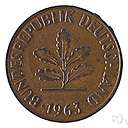deutsche mark
Also found in: Thesaurus, Medical, Legal, Financial, Acronyms, Idioms, Encyclopedia, Wikipedia.
deutsche mark
(doich′ märk′)n. Abbr. DM
The primary unit of currency in Germany before the adoption of the euro.
[German : deutsche, feminine singular of deutsch, German (from Middle High German diutsch, from Old High German diutisc, of the people; see teutā- in Indo-European roots) + Mark, mark (from Middle High German marc, marke, stamped precious metal bar, half-pound of silver or gold; see merg- in Indo-European roots).]
American Heritage® Dictionary of the English Language, Fifth Edition. Copyright © 2016 by Houghton Mifflin Harcourt Publishing Company. Published by Houghton Mifflin Harcourt Publishing Company. All rights reserved.
mark1
(mɑrk)n.
1. a visible impression on a surface, as a line, spot, scratch, dent, or stain.
2. a symbol used in writing or printing: a punctuation mark.
3. a token or indication; sign: to bow as a mark of respect.
4. a noticeable or lasting effect; imprint: The experience had left its mark on her.
5. a distinctive or characteristic trait: a mark of nobility.
6. a device or symbol serving to identify, indicate origin or ownership, etc.
7. trademark.
8. a sign, usu. a cross, made instead of a signature.
9.
a. a symbol used in rating a student's achievement; grade.
b. Often, marks. any evaluative rating: gave him high marks for trying.
10. an object or sign serving to indicate position.
11. a point reached, as on a scale or in a process: the halfway mark.
12. a recognized or required standard of merit: work that's not up to the mark.
13. a target; goal: to miss the mark.
14. distinction; note: a man of mark.
15.
a. an object of derision or abuse: an easy mark for bullies.
b. the victim of a swindle.
16. (cap.) (used with a numeral to designate a model of an item of manufacture, as a weapon or car.)
17. the starting line in a race.
18. any of the points marked at intervals on a sounding line to indicate depth.
19. a tract of land held in common by a medieval Germanic community.
20. Archaic. land forming a boundary.
v.t. 21. to be a distinguishing feature of: a day marked by sadness.
22. to put a mark or marks on.
23. to evaluate with an academic mark; grade: to mark exams.
24. to label with indications of price or quality: to mark merchandise.
25. to trace or form by or as if by marks: to mark out a plan of attack.
26. to designate by or as if by marks: to mark passages to be memorized.
27. to single out; destine: marked for greatness.
28. to record, as a score.
29. to make manifest: to mark approval with a nod.
30. to give heed to: Mark my words.
31. to observe: marked a change in the weather.
32. to deposit a scent mark on.
v.i. 33. to take notice; give attention; consider.
34. to make a mark or marks.
35. mark down,
a. to reduce the price of.
b. to note in writing.
36. mark up,
Idioms: a. to mar or deface with marks.
b. to mark with notations or symbols.
c. to raise the price of.
1. beside the mark, not pertinent; irrelevant.
2. make one's mark, to achieve success.
3. mark time,
a. to function in an unproductive way.
b. to move the feet alternately as if marching but without advancing.
4. overshoot or overstep the mark, to go beyond what is fitting or suitable.
5. wide of the mark, far from the target or objective.
[before 900; Middle English; Old English mearc mark, sign, borderland]
mark2
(mɑrk)n.
1. the basic currency of Germany, which has a fixed value relative to the euro.
2. markka.
3. a former English monetary unit equal to 13s. 4d.
4. a former European unit of weight, esp. for gold and silver, usu. equal to 8 ounces (249 grams).
[before 900; Old English marc unit of weight]
Mark
(mɑrk)n.
1. one of the four Evangelists: traditionally believed to be the author of the second Gospel.
2. the second Gospel.
3. King, a king of Cornwall in Arthurian legend: the husband of Iseult and uncle of Tristram.
Random House Kernerman Webster's College Dictionary, © 2010 K Dictionaries Ltd. Copyright 2005, 1997, 1991 by Random House, Inc. All rights reserved.
ThesaurusAntonymsRelated WordsSynonymsLegend:
Switch to new thesaurus
| Noun | 1. |  Deutsche Mark - formerly the basic unit of money in Germany Deutsche Mark - formerly the basic unit of money in GermanyGerman monetary unit - monetary unit in Germany pfennig - 100 pfennigs formerly equaled 1 Deutsche Mark in Germany |
Based on WordNet 3.0, Farlex clipart collection. © 2003-2012 Princeton University, Farlex Inc.